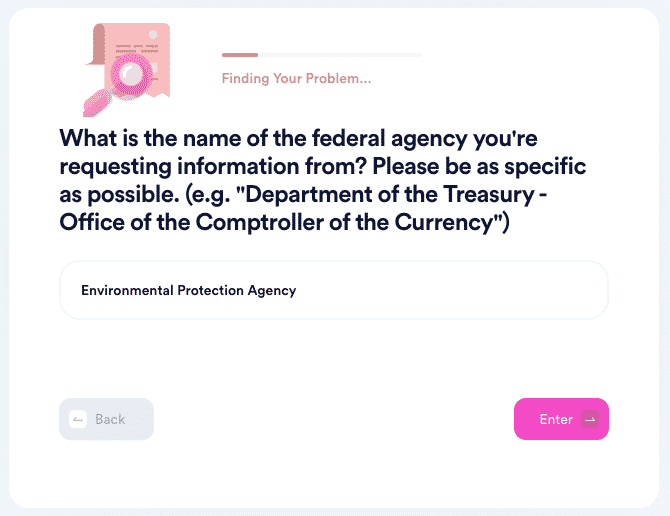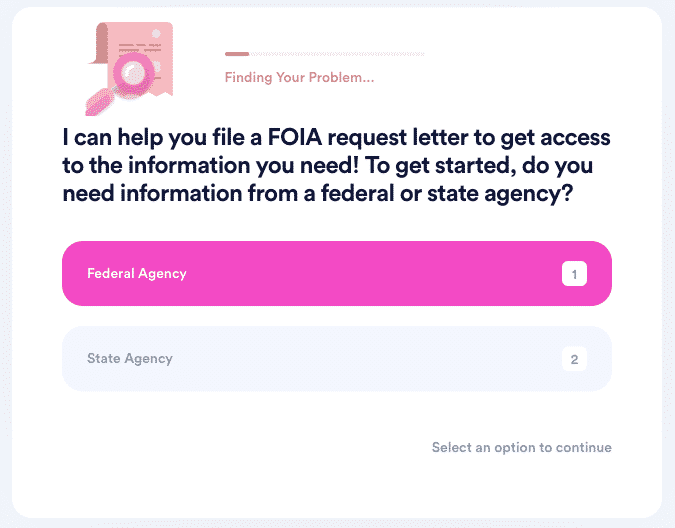Find Out Everything About the FOIA Exemptions
Everyone has the right to obtain information from federal institutions—except when they don’t. That sentence explains what the FOIA exemptions stand for. The Freedom of Information Act of 1966 has listed some documents as not available to everyone’s eyes.
In all the other cases, you may send a FOIA request to access information of your choice, and has the best feature to help you with the process.
What Are the Nine Exemptions to the Freedom of Information Act?
Congress has established several categories of information that federal agencies should not disclose. Freedom of information is not always available if revealing records can end up harming the government or private interest. There are nine FOIA exempt categories in total, and you can see them all in the table below:
- Classified information regarding national security
- Internal practices and rules of an agency
- Prohibited records due to other federal laws
- Privileged info about commercial and trade secrets
- Confidential information between agencies that come with the protection of privileges:
- Attorney-Client Privilege
- Attorney-Work Product Privilege
- Deliberative Process Privilege
- Personal records that could invade someone’s privacy, such as medical records
- Law enforcement records
- Financial institution information and bank supervision
- Geological and geophysical information about wells, for example
The FOIA expects agencies to withhold information in all situations when it is clear that revealing them could end up affecting any of the nine exemptions.
What Are the FOIA Exclusions?
In addition to exemptions, the FOIA also has exclusions, and you should know the difference. There are three categories of law enforcement and national security records that Congress has come up with—they are known as the FOIA exclusions. The focus of exclusions is on federal law enforcement agencies. Here’s a short explanation of each one:
|
FOIA Exclusion |
Brief Description |
|
The First Exclusion | It protects a criminal law enforcement investigation currently active. Revealing information can affect the enforcement proceeding. The subject of the investigation doesn’t know that it is pending |
|
The Second Exclusion | It keeps safe the records of the informant in the case when their status has not been confirmed yet. Connected to criminal law enforcement agencies |
|
The Third Exclusion | It protects counterintelligence and foreign intelligence records. It is limited to the FBI and also keeps safe info about international terrorism records |
Submit FOIA Requests With DoNotPay
Those nine exemptions exist, but they cover only a fraction of the available documents. You can obtain all the other federal records, and DoNotPay can help you send the requests without issues. The procedure is completely straightforward—you only need to follow these five steps:
- Access DoNotPay from any
- Find and select the FOIA feature
- Tell us if what type of agency you are dealing with—federal or state
- Type in the name of the agency
- Indicate if you wish to get a fee waiver or expedited processing
We will send the request letter to the agency immediately.

DoNotPay’s FOIA request feature can work with these agency types:
- Local
- State
- Federal

How To Submit a FOIA Request on Your Own
You can choose to go through the procedure of sending a FOIA request by yourself. Each agency has its own rules and regulations regarding this process. You’ll need to inform yourself well, and you should know that a universal FOIA request form does not exist.
Agencies accept FOIA requests sent via fax, email, and online forms. You should always check whether the records you want to see are already available on the agency’s website, and there might not be a need for a request at all.
Checking out FOIA templates can help you out with the process as well. If the agency denies your request, you should file an appeal and try your luck again.
DoNotPay Can Help You Send a FOIA Request to the Agency of Your Choice
DoNotPay can make accessing federal records from any agency a reality. It doesn’t matter what your field of interest is—if it’s not among the exemptions, we can help you send a request without issues. Here are some of the possible options:
- U.S. Immigration and Customs Enforcement (ICE)
- Central Intelligence Agency (CIA)
- Equal Employment Opportunity Commission (EEOC)
- United States Citizenship and Immigration Services (USCIS)
- Federal Bureau of Investigation (FBI)
- Internal Revenue Service (IRS)
- Food and Drug Administration (FDA)
How Long Do Agencies Need To Process a FOIA Request?
Normally, agencies will need between twenty and thirty days to process your request. It depends on when you send it, how many other requests were sent before, and how complex the request is. You can always check the status of your request at the agency’s FOIA Requester Service Center.
How Much Money Do You Need To File a FOIA Request?
You don’t need to pay a fee for filing a FOIA request—not at first. After the first 100 pages of duplication and two research hours, agencies will start charging you hourly for the work they do. Sometimes, the info you find when requesting records about yourself can completely be worth the money.
Don’t Let Companies Take Your Hard-Earned Money!
People love to subscribe to all sorts of services—especially if there are free trials involved. The problem is that most of them forget that they signed up for anything in the first place. Companies are aware of this, which is why they auto-renew memberships as soon as the free trials expire.
Don’t let them get away with it—use DoNotPay to sign up for free trials and cancel subscriptions right before they renew. If you want to save even more money, use our platform to learn how to handle high bills, parking tickets, college application fees, canceled or delayed flights, or faulty services you should get refunded for.
Use DoNotPay To Stop Illegal Activities and Earn off Scammers!
Our AI-powered platform can assist you in dealing with all sorts of scammers. If you got any of the following, the world’s first AI Consumer Champion will help you seek justice:
Do you want to protect yourself and your loved ones from stalking and harassment as well? Use DoNotPay to learn how! If the situation with a stalker escalates, our app is going to help you take them to small claims court by preparing all the paperwork and your court statement.
Don’t stop there—check out how you can bypass phone number verification, claim any type of warranty, or pass any government test with flying colors!


